- Home
- Iain M. Banks
Matter c-8
Matter c-8 Read online
Matter
( Culture - 8 )
Iain M. Banks
The Culture is a far-future society of seemingly limitless resources and infinite technological possibilities. Yet the Culture is far from perfect, and it is still subject to brutal wars, political upheaval and intrusions from beyond the edges of known space. With extraordinary imaginative scope and storytelling prowess, Iain M. Banks’ new Culture novel will be one of the most highly anticipated SF novels of the year.
Matter
by Iain M. Banks
For Adèle
With thanks to everybody who helped: Adèle, Les, Mic, Simon, Tim, Roger, Gary , Lara and Dave le Taxi.
Prologue
A light breeze produced a dry rattling sound from some nearby bushes. It lifted delicate little veils of dust from a few sandy patches nearby and shifted a lock of dark hair across the forehead of the woman sitting on the wood and canvas camp chair which was perched, not quite level, on a patch of bare rock near the edge of a low ridge looking out over the scrub and sand of the desert. In the distance, trembling through the heat haze, was the straight line of the road. Some scrawny trees, few taller than one man standing on another’s shoulders, marked the course of the dusty highway. Further away, tens of kilometres beyond the road, a line of dark, jagged mountains shimmered in the baking air.
By most human standards the woman was tall, slim and well muscled. Her hair was short and straight and dark and her skin was the colour of pale agate. There was nobody of her specific kind within several thousand light years of where she sat, though if there had been they might have said that she was somewhere between being a young woman and one at the very start of middle age. They would, however, have thought she looked somewhat short and bulky. She was dressed in a pair of wide, loose-fitting pants and a thin, cool-looking jacket, both the same shade as the sand. She wore a wide black hat to shade her from the late morning sun, which showed as a harsh white point high in the cloudless, pale green sky. She raised a pair of very old and worn-looking binoculars to her night-dark eyes and looked out towards the point where the desert road met the horizon to the west. There was a folding table to her right holding a glass and a bottle of chilled water. A small backpack lay underneath. She reached out with her free hand and lifted the glass from the table, sipping at the water while still looking through the ancient field glasses.
“They’re about an hour away,” said the machine floating to her left. The machine looked like a scruffy metal suitcase. It moved a little in the air, rotating and tipping as though looking up at the seated woman. “And anyway,” it continued, “you won’t see much at all with those museum pieces.”
She put the glass down on the table again and lowered the binoculars. “They were my father’s,” she said.
“Really.” The drone made a sound that might have been a sigh.
A screen flicked into existence a couple of metres in front of the woman, filling half her field of view. It showed, from a point a hundred metres above and in front of its leading edge, an army of men — some mounted, most on foot — marching along another section of the desert highway, all raising dust which piled into the air and drifted slowly away to the south-east. Sunlight glittered off the edges of raised spears and pikes. Banners, flags and pennants swayed above. The army filled the road for a couple of kilometres behind the mounted men at its head. Bringing up the rear were baggage carts, covered and open wagons, wheeled catapults and trebuchets and a variety of lumbering wooden siege engines, all pulled by dark, powerful-looking animals whose sweating shoulders towered over the men walking at their sides.
The woman tutted. “Put that away.”
“Yes, ma’am,” the machine said. The screen vanished.
The woman looked through the binoculars again, using both hands this time. “I can see their dust,” she announced. “And another couple of scouts, I think.”
“Astounding,” the drone said.
She placed the field glasses on the table, pulled the brim of her hat down over her eyes and settled back in the camp seat, folding her arms and stretching her booted feet out, crossed at the ankle. “Having a snooze,” she told the drone from beneath the hat. “Wake me when it’s time.”
“Just you make yourself comfortable there,” the drone told her.
“Mm-hmm.”
Turminder Xuss (drone, offensive) watched the woman Djan Seriy Anaplian for a few minutes, monitoring her slowing breathing and her gradually relaxing muscle-state until it knew she was genuinely asleep.
“Sweet dreams, princess,” it said quietly. Reviewing its words immediately, the drone was completely unable to determine whether a disinterested observer would have detected any trace of sarcasm or not.
It checked round its half-dozen previously deployed scout and secondary knife missiles, using their sensors to watch the still distant approaching army draw slowly closer and to monitor the various small patrols and individual scouts the army had sent out ahead of it.
For a while, it watched the army move. From a certain perspective it looked like a single great organism inching darkly across the tawny sweep of desert; something segmented, hesitant — bits of it would come to a stop for no obvious reason for long moments, before starting off again, so that it seemed to shuffle rather than flow en masse — but determined, unarguably fixed in its onward purpose. And all on their way to war, the drone thought sourly, to take and burn and loot and rape and raze. What sullen application these humans devoted to destruction.
About half an hour later, when the front of the army was hazily visible on the desert highway a couple of kilometres to the west, a single mounted scout came riding along the top of the ridge, straight towards where the drone kept vigil and the woman slept. The man showed no sign of having seen through the camouflage field surrounding their little encampment, but unless he changed course he was going to ride right into them.
The drone made a tutting noise very similar to the one the woman had made earlier and told its nearest knife missile to spook the mount. The pencil-thin shape came darting in, effectively invisible, and jabbed the beast in one flank so that it screamed and jerked, nearly unseating its rider as it veered away down the shallow slope of ridge towards the road.
The scout shouted and swore at his animal, reining it in and turning its broad snout back towards the ridge, some distance beyond the woman and the drone. They galloped away, leaving a thin trail of dust hanging in the near-still air.
Djan Seriy Anaplian stirred, sat up a little and looked out from under her hat. “What was all that?” she asked drowsily.
“Nothing. Go back to sleep.”
“Hmm.” She relaxed again and a minute later was quietly snoring.
The drone woke her when the head of the army was almost level with them. It bobbed its front at the body of men and animals a kilometre distant while Anaplian was still yawning and stretching. “The boys are all here,” it told her.
“Indeed they are.” She lifted the binoculars and focused on the very front of the army, where a group of men rode mounted on especially tall, colourfully caparisoned animals. These men wore high plumed helmets and their polished armour glittered brightly in the glare. “They’re all very parade ground,” Anaplian said. “It’s like they’re expecting to bump into somebody out here they need to impress.”
“God?” the drone suggested.
The woman was silent for a moment. “Hmm,” she said eventually. She put the field glasses down and looked at the drone. “Shall we?”
“Merely say the word.”
Anaplian looked back at the army, took a deep breath and said, “Very well. Let us do this.”
The drone made a little dipping motion like a nod. A small hatch opened in its side. A cylinder perhaps four centimetres wide
and twenty-five long, shaped like a sort of conical knife, rolled lazily into the air then darted away, keeping close to the ground and accelerating quickly towards the rear of the column of men, animals and machines. It left a trail of dust for a moment before it adjusted its altitude. Anaplian lost sight of its camouflaged shape almost immediately.
The drone’s aura field, invisible until now, glowed rosily for a moment or two. “This,” it said, “should be fun.”
The woman looked at it dubiously. “There aren’t going to be any mistakes this time, are there?”
“Certainly not,” the machine said crisply. “Want to watch?” it asked her. “I mean properly, not through those antique opera glasses.”
Anaplian looked at the machine through narrowed eyes for a little, then said, slowly, “All right.”
The screen blinked into existence just to one side of them this time, so that Anaplian could still see the army in the distance with the naked eye. The screen view was from some distance behind the great column now, and much lower than before. Dust drifted across the view. “That’s from the trailing scout missile,” Turminder Xuss said. Another screen flickered next to the first. “This is from the knife missile itself.” The camera in the knife missile registered the tiny machine scudding past the army in a blur of men, uniforms and weapons, then showed the tall shapes of the wagons, war machines and siege engines before banking sharply after the tail end of the army was passed. The rushing missile stooped, taking up a position a kilometre behind the rear of the army and a metre or so above the road surface. Its speed had dropped from near-supersonic to something close to that of a swiftly flying bird. It was closing rapidly with the rear of the column.
“I’ll synch the scout to the knife, follow it in behind,” the drone said. In moments, the flat circular base of the knife missile appeared as a dot in the centre of the scout missile’s view, then expanded until it looked like the smaller machine was only a metre behind the larger one. “There go the warps!” Xuss said, sounding excited. “See?”
Two arrowhead shapes, one on either side, detached from the knife missile’s body, swung out and disappeared. The mono-filament wires which still attached each of the little warps to the knife missile were invisible. The view changed as the scout missile pulled back and up, showing almost the whole of the army ahead.
“I’ll get the knife to buzz the wires,” the drone said.
“What does that mean?”
“Vibrates them, so that whatever the monofils go through, it’ll be like getting sliced by an implausibly sharp battleaxe rather than the world’s keenest razor,” the drone said helpfully.
The screen displaying what the scout missile could see showed a tree a hundred metres behind the last, trundling wagon. The tree jerked and the top three-quarters slid at a steep angle down the sloped stump that was the bottom quarter before toppling to the dust. “That took a flick,” the drone said, glowing briefly rosy again and sounding amused. The wagons and siege engines filled the view coming from the knife missile. “The first bit’s actually the trickiest…”
The fabric roofs of the covered wagons rose into the air like released birds; tensed hoops of wood — cut — sprang apart. The giant, solid wheels of the catapults, trebuchets and siege engines shed their top sections on the next revolution and the great wooden structures thudded to a halt, the top halves of some of them, also cut through, jumping forward with the shock. Arm-thick lengths of rope, wound rock-tight a moment earlier, burst like released springs then flopped like string. The scout missile swung between the felled and wrecked machines as the men in and around the wagons and siege engines started to react. The knife missile powered onwards, towards the foot soldiers immediately ahead. It plunged into the mass of spears, pikes, pennant poles, banners and flags, scything through them in a welter of sliced wood, falling blades and flapping fabric.
Anaplian caught glimpses of a couple of men slashed or skewered by falling pikeheads.
“Bound to be a few casualties,” the drone muttered.
“Bound to be,” the woman said.
The knife missile was catching glimpses of confused faces as men heard the shouts of those behind them and turned to look. The missile was a half-second away from the rear of the mass of mounted men and roughly level with their necks when the drone sent.
— Are you sure we can’t…?
— Positive, Anaplian replied, inserting a sigh into what was an entirely non-verbal exchange. — Just stick to the plan.
The tiny machine nudged up a half-metre or so and tore above the mounted men, catching their plumed helmets and chopping the gaudy decorations off like a harvest of motley stalks. It leapt over the head of the column, leaving consternation and fluttering plumage in its wake. Then it zoomed, heading skywards. The following scout missile registered the monofil warps clicking back into place in the knife missile’s body before it swivelled, rose and slowed, to look back at the whole army again.
It was, Anaplian thought, a scene of entirely satisfactory chaos, outrage and confusion. She smiled. This was an event of such rarity that Turminder Xuss recorded the moment.
The screens hanging in the air disappeared. The knife missile reappeared and swung into the offered hatchway in the side of the drone.
Anaplian looked out over the plain to the road and the halted army. “Many casualties?” she asked, smile disappearing.
“Sixteen or so,” the drone told her. “About half will likely prove fatal, in time.”
She nodded, still watching the distant column of men and machines. “Oh well.”
“Indeed,” Turminder Xuss agreed. The scout missile floated up to the drone and also entered via a side panel. “Still,” the drone said, sounding weary, “we should have done more.”
“Should we.”
“Yes. You ought to have let me do a proper decapitation.”
“No,” Anaplian said.
“Just the nobles,” the drone said. “The guys right at the front. The ones who came up with their spiffing war plans in the first place.”
“No,” the woman said again, rising from her seat and, turning, folding it. She held it in one hand. With the other she lifted the old pair of binoculars from the table. “Module coming?”
“Overhead,” the drone told her. It moved round her and picked up the camp table, placing the glass and water bottle inside the backpack beneath. “Just the two nasty dukes? And the King?”
Anaplian held on to her hat as she looked straight up, squinting briefly in the sunlight until her eyes adjusted. “No.”
“This is not, I trust, some kind of transferred familial sentimentality,” the drone said with half-pretended distaste.
“No,” the woman said, watching the shape of the module ripple in the air a few metres away.
Turminder Xuss moved towards the module as its rear door hinged open. “And are you going to stop saying ‘no’ to me all the time?”
Anaplian looked at it, expressionless.
“Never mind,” the drone said, sighing. It bob-nodded towards the open module door. “After you.”
The Expeditionary
1. Factory
The place had to be some sort of old factory or workshop or something. There were big toothed metal wheels half buried in the wooden floors or hanging by giant spindles from the network of iron beams overhead. Canvas belts were strung all over the dark spaces connecting smaller, smooth wheels and a host of long, complicated machines he thought might be something to do with weaving or knitting. It was all very dusty and grimy-looking. And yet this had been that modern thing; a factory! How quickly things decayed and became useless.
Normally he would never have considered going anywhere near some place so filthy. It might not even be safe, he thought, even with all the machinery stilled; one gable wall was partially collapsed, bricks tumbled, planks splintered, rafters hanging disjointed from above. He didn’t know if this was old damage from deterioration and lack of repair, or something that had happened today, dur
ing the battle. In the end, though, he hadn’t cared what the place was or had been; it was somewhere to escape to, a place to hide.
Well, to regroup, to recover and collect himself. That put a better gloss on it. Not running away, he told himself; just staging a strategical retreat, or whatever you called it.
Outside, the Rollstar Pentrl having passed over the horizon a few minutes earlier, it was slowly getting dark. Through the breach in the wall he could see sporadic flashes and hear the thunder of artillery, the crump and bellowing report of shells landing uncomfortably close by and the sharp, busy rattle of small arms fire. He wondered how the battle was going. They were supposed to be winning, but it was all so confusing. For all he knew they were on the brink of complete victory or utter defeat.
He didn’t understand warfare, and having now experienced its practice first hand, had no idea how people kept their wits about them in a battle. A big explosion nearby made the whole building tremble; he whimpered as he crouched down, pressing himself still further into the dark corner he had found on the first floor, drawing his thick cloak over his head. He heard himself make that pathetic, weak little sound and hated himself for it. Breathing under the cloak, he caught a faint odour of dried blood and faeces, and hated that too.
He was Ferbin otz Aelsh-Hausk’r, a prince of the House of Hausk, son of King Hausk the Conqueror. And while he was his father’s son, he had not been raised to be like him. His father gloried in war and battle and dispute, had spent his entire life aggressively expanding the influence of his throne and his people, always in the name of the WorldGod and with half an eye on history. The King had raised his eldest son to be like him, but that son had been killed by the very people they were fighting, perhaps for the last time, today. His second son, Ferbin, had been schooled in the arts not of war but of diplomacy; his natural place was supposed to be in the court, not the parade ground, fencing stage or firing range, still less the battlefield.

 Use of Weapons
Use of Weapons Transition
Transition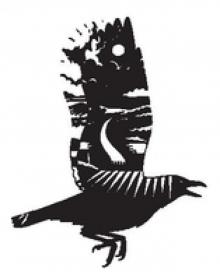 The Crow Road
The Crow Road Feersum Endjinn
Feersum Endjinn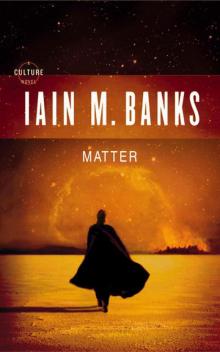 Matter
Matter Surface Detail
Surface Detail The Wasp Factory
The Wasp Factory Consider Phlebas
Consider Phlebas Against a Dark Background
Against a Dark Background Excession
Excession The Hydrogen Sonata
The Hydrogen Sonata The Algebraist
The Algebraist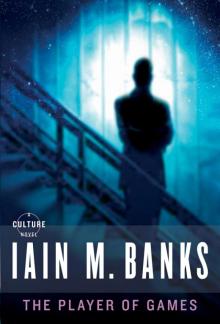 The Player of Games
The Player of Games The State of the Art
The State of the Art The Hydrogen Sonata c-10
The Hydrogen Sonata c-10 Excession c-5
Excession c-5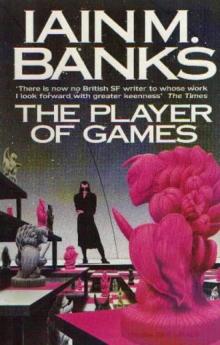 The Player of Games c-2
The Player of Games c-2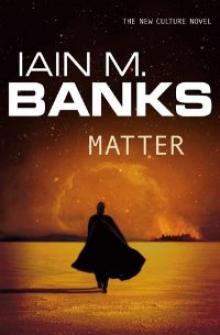 Matter c-8
Matter c-8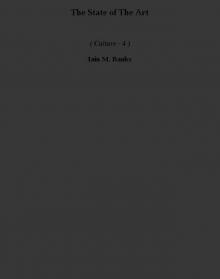 The State of The Art c-4
The State of The Art c-4 Look to Windward c-7
Look to Windward c-7 Consider Phlebas c-1
Consider Phlebas c-1